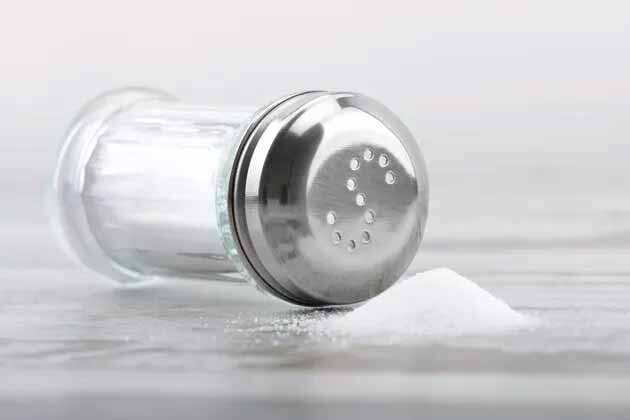
Commercial table salt consists mainly of sodium chloride, an electrolyte mineral compound that directly affects human blood pressure. When you consume salt, it dissolves in food liquid and stomach fluid, and your body absorbs the minerals when they reach your small intestine. Your digestive time frame depends on what else you have eaten and how quickly your stomach empties its food contents into your colon. At that juncture, the sodium element fulfills its metabolic role in fluid balance, immediately raising your blood pressure as a side effect.
Short-Term Effects
As soon as sodium enters your bloodstream from the intestine, it changes your electrolyte balance, triggering a shift in body fluids. Fluids leave the cells and intercellular spaces and move into the blood, to help restore the ratio of electrolyte minerals to body fluid required for homeostasis. The additional volume flowing through the blood vessels exerts greater force and pushes blood pressure upward.
Kidney Regulation
At the same time, the cardiovascular system signals the kidneys to eliminate more sodium from the body. It does so by excreting more urine or by increasing the sodium concentration in urine. A healthy body performs this function daily when sodium and potassium intakes stay within a certain range. Potassium, another electrolyte mineral, reduces the effects of sodium on fluid migration.
High Salt Intake
Most Americans do not control their salt intakes to consume lesser amounts of sodium than potassium from their diets. Depending on your age and heart health, the Institute of Medicine considers 1,500 milligrams to 2,300 milligrams of sodium vs. 4,700 milligrams of potassium a proper dietary ratio. Average sodium intakes exceed recommendations at 3,300 milligrams per day, while potassium intakes fall short at 2,600 milligrams per day. This inverted ratio exacerbates the high-sodium effects, which are generated mainly by eating too much salty food. The U.S. Department of Agriculture attributes this overconsumption to the prevalence of processed foods in American diets.
Significance
Short-term changes in blood pressure become chronic over time. If you persist in a high-sodium diet, your blood pressure remains high because the kidneys can longer process the excessive amount of minerals. As a result, the heart, arteries and kidneys can sustain damage from the added stress. High blood pressure requires lifelong medical management. It is also a risk factor for heart attack, stroke and kidney failure.
References:
- National Digestive Diseases Information Clearinghouse; Your Digestive System and How It Works; April 2008
- Merck Manual Home Health Handbook; Sodium; August 2008
- Harvard School of Public Health: Lower Salt and Sodium
- U.S. Department of Agriculture: Dietary Guidelines for Americans 2010
- NIH Research Matters; Sodium-Potassium Ratio Linked to Cardiovascular Disease Risk; January 2009
- National Heart Lung and Blood Institutes; Your Guide to Lowering Your Blood Pressure With DASH; April 2006
Important Notice: This article was originally published at www.livestrong.com by Nancy Clarke where all credits are due.
Disclaimer
The watching, interacting, and participation of any kind with anything on this page does not constitute or initiate a doctor-patient relationship with Dr. Farrah™. None of the statements here have been evaluated by the Food and Drug Administration (FDA). The products of Dr. Farrah™ are not intended to diagnose, treat, cure, or prevent any disease. The information being provided should only be considered for education and entertainment purposes only. If you feel that anything you see or hear may be of value to you on this page or on any other medium of any kind associated with, showing, or quoting anything relating to Dr. Farrah™ in any way at any time, you are encouraged to and agree to consult with a licensed healthcare professional in your area to discuss it. If you feel that you’re having a healthcare emergency, seek medical attention immediately. The views expressed here are simply either the views and opinions of Dr. Farrah™ or others appearing and are protected under the first amendment.
Dr. Farrah™ is a highly experienced Licensed Medical Doctor certified in evidence-based clinical nutrition, not some enthusiast, formulator, or medium promoting the wild and unrestrained use of nutrition products for health issues without clinical experience and scientific evidence of therapeutic benefit. Dr. Farrah™ has personally and keenly studied everything she recommends, and more importantly, she’s closely observed the reactions and results in a clinical setting countless times over the course of her career involving the treatment of over 150,000 patients.
Dr. Farrah™ promotes evidence-based natural approaches to health, which means integrating her individual scientific and clinical expertise with the best available external clinical evidence from systematic research. By individual clinical expertise, I refer to the proficiency and judgment that individual clinicians acquire through clinical experience and clinical practice.
Dr. Farrah™ does not make any representation or warranties with respect to the accuracy, applicability, fitness, or completeness of any multimedia content provided. Dr. Farrah™ does not warrant the performance, effectiveness, or applicability of any sites listed, linked, or referenced to, in, or by any multimedia content.
To be clear, the multimedia content is not intended to be a substitute for professional medical advice, diagnosis, or treatment. Always seek the advice of your physician or other qualified health providers with any questions you may have regarding a medical condition. Never disregard professional medical advice or delay in seeking it because of something you have read or seen in any website, video, image, or media of any kind. Dr. Farrah™ hereby disclaims any and all liability to any party for any direct, indirect, implied, punitive, special, incidental, or other consequential damages arising directly or indirectly from any use of the content, which is provided as is, and without warranties.








